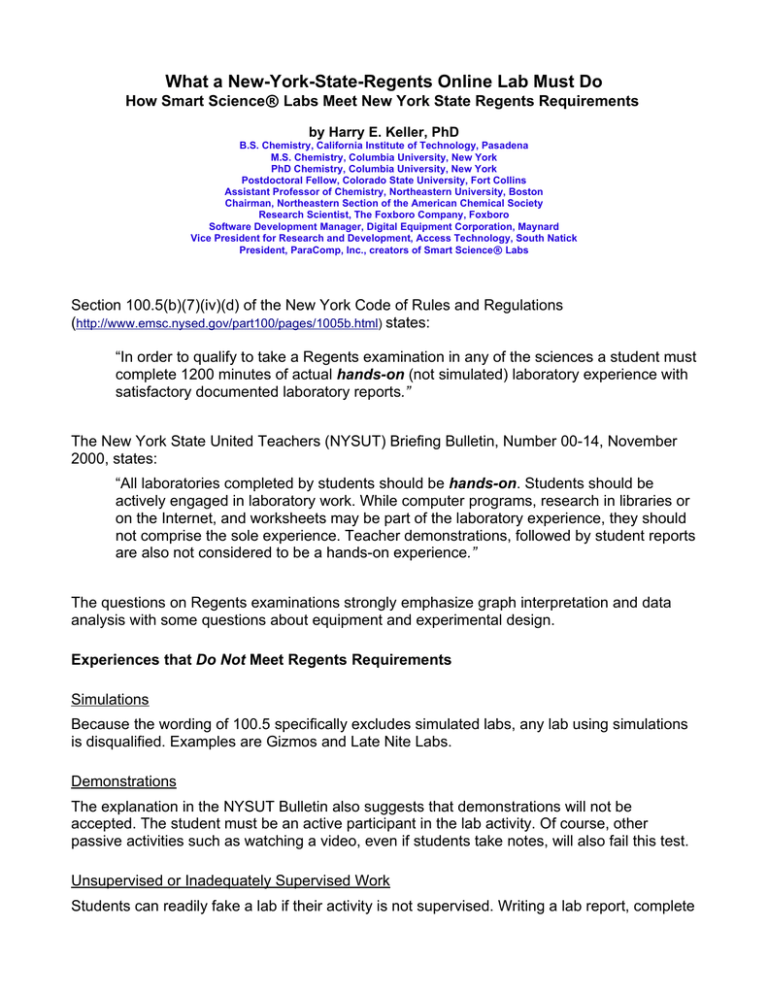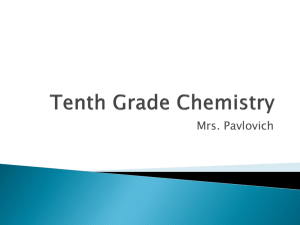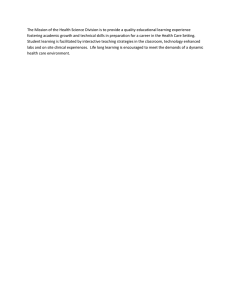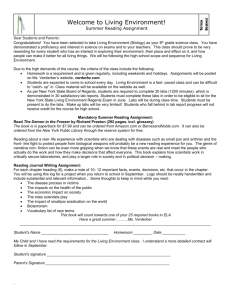What a New-York-State-Regents Online Lab Must Do
advertisement

What a New-York-State-Regents Online Lab Must Do How Smart Science® Labs Meet New York State Regents Requirements by Harry E. Keller, PhD B.S. Chemistry, California Institute of Technology, Pasadena M.S. Chemistry, Columbia University, New York PhD Chemistry, Columbia University, New York Postdoctoral Fellow, Colorado State University, Fort Collins Assistant Professor of Chemistry, Northeastern University, Boston Chairman, Northeastern Section of the American Chemical Society Research Scientist, The Foxboro Company, Foxboro Software Development Manager, Digital Equipment Corporation, Maynard Vice President for Research and Development, Access Technology, South Natick President, ParaComp, Inc., creators of Smart Science® Labs Section 100.5(b)(7)(iv)(d) of the New York Code of Rules and Regulations (http://www.emsc.nysed.gov/part100/pages/1005b.html) states: “In order to qualify to take a Regents examination in any of the sciences a student must complete 1200 minutes of actual hands-on (not simulated) laboratory experience with satisfactory documented laboratory reports.” The New York State United Teachers (NYSUT) Briefing Bulletin, Number 00-14, November 2000, states: “All laboratories completed by students should be hands-on. Students should be actively engaged in laboratory work. While computer programs, research in libraries or on the Internet, and worksheets may be part of the laboratory experience, they should not comprise the sole experience. Teacher demonstrations, followed by student reports are also not considered to be a hands-on experience.” The questions on Regents examinations strongly emphasize graph interpretation and data analysis with some questions about equipment and experimental design. Experiences that Do Not Meet Regents Requirements Simulations Because the wording of 100.5 specifically excludes simulated labs, any lab using simulations is disqualified. Examples are Gizmos and Late Nite Labs. Demonstrations The explanation in the NYSUT Bulletin also suggests that demonstrations will not be accepted. The student must be an active participant in the lab activity. Of course, other passive activities such as watching a video, even if students take notes, will also fail this test. Unsupervised or Inadequately Supervised Work Students can readily fake a lab if their activity is not supervised. Writing a lab report, complete with fake or copied data, when the lab as never been done is known as doing a dry lab. The clear intent of the Regents requirements is that students collect their own unique data. Experiences that Do Meet Regents Requirements Scientific Inquiry While section 100.5 does not address this issue, you can find it covered in many places including the NSES Science as Inquiry section. A good summary of these documents is: Science is a process involving the testing of ideas by data collection from the real world. Students should test their ideas against these data. That is, they should perform data analysis with the ideas being tested in mind. Many high school science labs use directed scientific inquiry if they use scientific inquiry at all. The student is given almost no latitude in deciding what to do. Often, students are told what answer to expect in advance of the lab. The option of open scientific inquiry is not available to most high school students who lack the sophistication and background to choose their own topic of investigation, research the background, design experiments, safely conduct them, analyze the results and report them in a scholarly fashion. A few science fair projects appear to meet these criteria, but proabably had considerable outside help. The correct approach has been in limited and sporadic use for over 100 years. That approach is guided scientific inquiry. Simply, the student makes choices and is guided in making them so that success is much more likely than failure. Real experiments and "hands-on" data collection The data should come from the real world. If experiments are performed, they should be real and not simulated. If students collect data without experiments, the data should come from the real world and not from simulations. Real world data has several benefits that are crucial to understanding science. • • • • Engaging Students are more likely to become interested in the real world than in a facsimile. Experimental error Students must experience real world experimental error so that they understand that all science is imprecise. Limits Real experiments expose limitations of predictions and show students that ideal theories do not usually model actual behavior. Require care Students learn that the quality of their data depends on the care with which they take them. They may also discover aspects of experimental design that affect the data quality. This experience does not require that students touch the experimental apparatus. For those students embarking on a science-centric or laboratory-oriented career, exposure to these artifacts of their chosen discipline is important. For all students exposure to the process and thinking processes of science is far more important. Most students will never again, after their high school biology class, operate a microscope. What they see through the microscope and how they analyze what they see is far more important than being able to operate one. How Smart Science® Labs Meet New York State Regents Requirements The Smart Science® system meets all of the above criteria. Smart Science® labs are not simulated. Students must collect their data point by point and exercise their own judgment about which experiments to run and how to collect their data. Poor data can produce poor results. Students must disprove hypotheses or predictions and defend their conclusions in a lab report. Students get a real science experience! Hybrid Labs Because some manipulative experience supports learning in many students, the Smart Science® system includes hybrid labs where manipulative experiments ("wet" labs) are combined with virtual experiments in the same lab experience. While we believe that the Smart Science® labs are sufficient by themselves to meet the Regents requirements, adding an offline manipulative experience clearly meets the guidelines fully. Lab Related Activities The NYSUT Bulletin states that other activities, including computer programs, can be part of the laboratory experience. The Smart Science® system includes the following activities that fall into the categories allowed. • • • • • • Warm-up This preparation for a lab checks that students have thought about the topics involved in the lab. Extension and preparation The virtual experiments can be used as a means to test ideas not testable within the time, cost and safety constraints of the usual lab. They can also be used to prepare a student for doing the offline manipulative lab. Post-lab assessment These questions ensure that the students have contemplated their data and understand its implications. They take the role of a part of a worksheet. Online lab report This portion replaces the rest of the worksheet and meets the requirement of a "satisfactory documented laboratory report." Extra Exploration This optional section extends the student experience further and can be customized (just as all sections can) to meet specific school requirements. Pure offline "wet" labs The Smart Science® system allows you to include in your lab mix totally offline labs. Students can still have the pre-lab assessment, the post-lab assessment, the online lab report and all of the supporting material. Extra Benefits By choosing to use the Smart Science® system, you get many more benefits. • • • • • • • Dry labs not possible Consistent student reports Real-time online tracking and accountability All supporting materials for students and teachers Ease in grading and in communication with students Regents-required lab documentation saved in permanent database. Low cost Most of all, you get a system that has been designed by scientists to require students to do real science and thus to understand what science really is. Offer to See Smart Science® Labs in Action Please contact Paracomp at 310-773-4293. References Smart Science® labs have been used in schools for over 3 years. Please contact Paracomp at 310-773-4293 for references applicable to your requirements. Copyright 2006 ParaComp, Inc. CA U.S.A. Smart Science labs are patented under U.S. Patent No. 6,529,705. Smart Science is a registered trademark of ParaComp, Inc. 310-773-4293 smartscience@paracompusa.com smartscience.net


